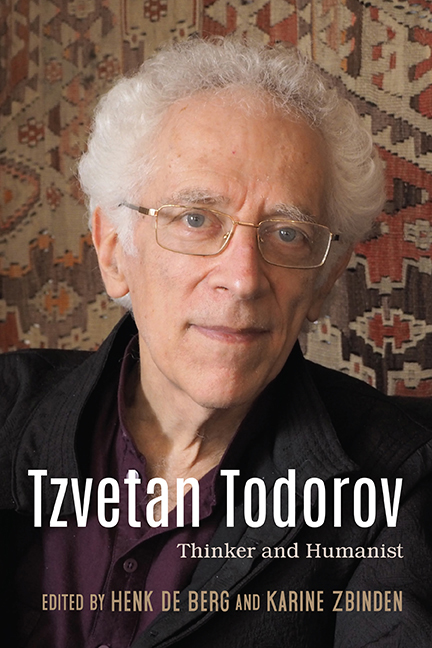Book contents
- Frontmatter
- Contents
- Acknowledgments
- Introduction
- 1 A Marginal Centrist: Tzvetan Todorov and the French Intellectual Field
- 2 Todorov and Camus
- 3 The Enlightenment Redux: Autonomy in Todorov, Glucksmann, and Onfray
- 4 Todorov's Reading of Rousseau: A Heritage for Our Times?
- 5 Tzvetan Todorov's Enlightenment
- 6 Todorov and Bakhtin
- 7 Tzvetan Todorov and the Writing of History
- 8 Tzvetan Todorov and the Trials of History: A Dissenting Voice
- 9 European Integration and the Cultural Cold War: Todorov and Denis de Rougemont
- 10 Tzvetan Todorov on Totalitarianism, Scientism, and Utopia
- 11 Tzvetan Todorov's Political Philosophy
- 12 Interview with Tzvetan Todorov
- Notes on the Contributors
- Index
5 - Tzvetan Todorov's Enlightenment
Published online by Cambridge University Press: 26 April 2020
- Frontmatter
- Contents
- Acknowledgments
- Introduction
- 1 A Marginal Centrist: Tzvetan Todorov and the French Intellectual Field
- 2 Todorov and Camus
- 3 The Enlightenment Redux: Autonomy in Todorov, Glucksmann, and Onfray
- 4 Todorov's Reading of Rousseau: A Heritage for Our Times?
- 5 Tzvetan Todorov's Enlightenment
- 6 Todorov and Bakhtin
- 7 Tzvetan Todorov and the Writing of History
- 8 Tzvetan Todorov and the Trials of History: A Dissenting Voice
- 9 European Integration and the Cultural Cold War: Todorov and Denis de Rougemont
- 10 Tzvetan Todorov on Totalitarianism, Scientism, and Utopia
- 11 Tzvetan Todorov's Political Philosophy
- 12 Interview with Tzvetan Todorov
- Notes on the Contributors
- Index
Summary
IN THIS CHAPTER, I propose to interpret Tzvetan Todorov's theory of the Enlightenment in the context of the work of two of his contemporaries, Jürgen Habermas and Jonathan Israel, who likewise view Enlightenment thought as the key to our understanding of modern history and to the social and political dilemmas we face today. I am interested not only in their views of the Enlightenment as a cultural and historical phenomenon and the norms and values they associate with it but also in the specific genealogies they construct for their versions of the Enlightenment.
All three thinkers argue for the continued relevance of the Enlightenment for our time, after its legacy was put in doubt in particular by Max Horkheimer's and Theodor W. Adorno's Dialektik der Aufklarung (Dialectic of Enlightenment), first published in 1947 but not part of the intellectual canon until the 1960s. Horkheimer and Adorno argue that the Enlightenment had failed because rationality had turned into its own mythology and as a result had been usurped by the twentieth century’s major totalitarian ideologies. Their seminal text set the stage for a postwar discourse highly critical of the Enlightenment, a discourse represented by such texts as Jean-François Lyotard's La condition postmoderne (The Postmodern Condition, 1979) and Michel Foucault's famous essay “Qu’est-ce que les Lumieres?” (“What Is Enlightenment?,” 1983). Both texts seek to elaborate on the repressive and exclusionary dimensions of Enlightenment thought identified by Horkheimer and Adorno and paint a predominantly negative picture of Enlightenment thinking, its aims, and the way it functioned in practice.
But a counterdiscourse emerged as well. Against Horkheimer and Adorno's pessimism, Jürgen Habermas—initially in Strukturwandel der Offentlichkeit (The Structural Transformation of the Public Sphere, 1962) and later in his two-volume Theorie des kommunikativen Handelns (The Theory of Communicative Action, 1981) and Der philosophische Diskurs der Moderne (The Philosophical Discourse of Modernity, 1985)— aimed to develop concepts of communicative reason and a public sphere that were based on central features of Enlightenment thought. Jonathan Israel entered the debate in the early 2000s with the volumes Radical Enlightenment (2001), Enlightenment Contested (200 6), and Democratic Enlightenment (2011), in which he attempts to demonstrate the existence of a radical political current within Enlightenment thinking.
- Type
- Chapter
- Information
- Tzvetan TodorovThinker and Humanist, pp. 92 - 108Publisher: Boydell & BrewerPrint publication year: 2020



